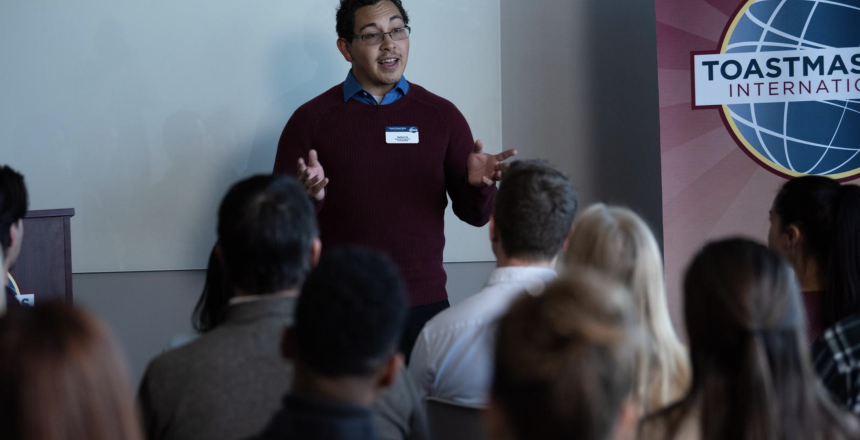“Never doubt that a small group of thoughtful, concerned citizens can change the world. Indeed, it is the only thing that ever has.” — Margaret Mead.
Many join a local Toastmasters club because they fear public speaking. Speaking up during company meetings or having to give a five-minute presentation gives them the shakes. Defining a “successful” speaker is subjective, which is why those who join Toastmasters find success in providing a toast without falling apart at a wedding. Toastmasters help people be more at ease when speaking in front of others. There isn’t anything like a supportive and nurturing Toastmasters audience—a live audience. Toastmaster clubs are a great place to find that live audience.
The support begins on the first visit when most guests serve up 30 seconds of words in response to the question, “Why did you decide to visit our club this evening?” My response was, “To speak.” For many, it’s the most nerve-wracking 30 seconds of the meeting. These 30 seconds pass quickly, and guests can settle back into their seats, breathe easily, and hope they don’t have to speak for the next two hours. Near the close of the meeting, the anxiety returns when the chairperson asks, “We’d love to hear from our guests and their thoughts. Can you give us some feedback about the meeting?” By this time, a guest may feel more relaxed.
The greatest thing that happens at any Toastmasters meeting is the live audience. Club membership numbers range from under ten members to 200.
What matters is the safe and live audience
At Toastmasters, people speak in front of live audiences that provide more constructive feedback than you might not receive in corporate settings or standing in front of a mirror. A Toastmasters’ first speech, known as the Ice breaker of four to six minutes, is as nerve-wracking as a 30-second introduction. You are now standing in front of 10 to 16 people, primarily supportive, while you spill everything there is to know about you.
There are speaking paths to follow. A program called Pathways develops your skills and leads you toward a goal to make you an impressive speaker. You will be a great Toastmaster with feedback and learning from the Toastmaster mentoring program.
Explore other Toastmaster clubs
At other clubs, you’ll encounter various audiences, expanding your experience base and challenging your comfort zone. These audiences are generally secure. Speaking to the same club creates a cozy and warm comfort zone. Eventually, you’ll establish a reputation inside your Toastmasters’ club. Exploring other clubs will prove valuable. New audience. New evaluators. New ideas.
Speak. Speak. Lead.
As a Toastmaster, you can speak about anything. There is an almost unofficial drive to talk about oneself—almost every contest speech is about overcoming. Overcoming personal obstacles is essential, yet the emphasis is on the self, and it’s practically the mantra to spend 90% of your speech jumbling about yourself.
The key to delivering a successful speech is showing your audience you care about them. Are you another salesperson giving an elevator pitch? Are you more important than the audience? Doing a backflip or a cartwheel on stage doesn’t amount to anything—if I can’t do a backflip or a cartwheel, why am I paying to listen to you?
Okay, I’m exaggerating. Toastmasters isn’t only for improving your public speaking or communication skills. You will learn how to structure your presentation and incorporate tone and body language to engage your audience.
Be fast on your feet
During the impromptu session of every meeting, known as the two-minute table topics, you will learn how to think on your feet. You get two minutes to answer a question. Table topics are fun and will help you think on your feet.
When you speak, no matter how thoroughly you rehearse, it’s inevitable that you’ll stumble upon at least one unexpected question from your audience. Your table-topic experience will be with you. If an audience member throws a curveball question, you can smoothly and confidently answer because of your Toastmasters table-topics experiences.
Table-topics is a most valuable part of Toastmasters.
If you want to learn more about speech writing or have an upcoming presentation, send me an email at richard@richardtardif.com
About Richard Tardif: An award-winning journalist, a bestselling author and editor, a proven writing and speaking coach, and a member of Pointe-Claire Toastmasters and Dorval City Toastmasters. He has a tangible and sympathetic heart to share with readers, wordsmiths, and other professional communicators.







